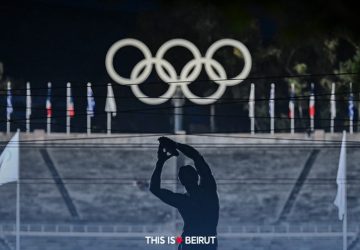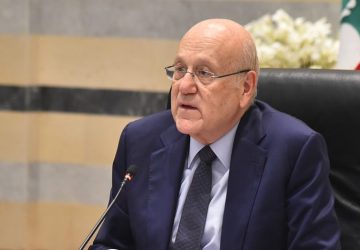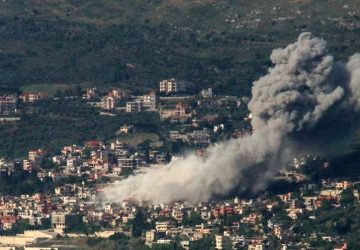Listen to the article
Jean-Yves Le Drian, President Emmanuel Macron’s personal envoy to Lebanon, ended his three-day reconnaissance mission in Beirut. Leaving to France on Saturday, he carries with him several political messages. Among them, the opposition camp’s determination to go all the way in the political confrontation with Hezbollah, and to refuse to let one side impose its candidate and agenda on the others.
The long hours Jean-Yves Le Drian spent with the main Lebanese protagonists undoubtedly gave him a clear idea of each political camp’s positions. The many questions that French President Emmanuel Macron’s personal envoy asked, and the answers that he meticulously documented, clearly reconstruct the “jigsaw” of the current Lebanese political landscape. That is, a most serious crisis, reflected in the inability of the sovereignist parties and March 8 camp to secure the election of their candidate to the presidency of the Republic.
Among the many messages expressed during these talks, there is one that Jean-Yves Le Drian will undoubtedly remember and pass to president Macron: the opposition parties are determined to go all the way in the political confrontation with Hezbollah, and will no longer accept the group’s attempts to impose not only its candidate for the presidency, but also its total control of the country’s institutions.
Two Compromises
The sovereignist opposition’s leaders who met with former French Minister of Foreign Affairs Le Drian expressed a firm position.
They rejected any parallelism that March 8 is trying to establish between the candidacy of former Minister Jihad Azour and that of Marada leader Sleiman Frangieh.
The latter was, from the outset, the candidate of the Amal movement and Hezbollah, whereas the choice of Azour was the result of two compromises, said the opposition.
In this regard, if we were to follow the logic that allowed Hezbollah to secure the election of Free Patriotic Movement (FPM) founder Michel Aoun to the presidency in 2016, the opposition should have put forward the candidacy of Lebanese Forces (LF) leader Samir Geagea. In 2016, Hezbollah argued that the “strongest candidate within its community” should be elected president, meaning the largest Christian parliamentary bloc. In 2022, the LF parliamentary bloc obtained a higher total of Christian votes than all the other blocs.
However, for the sake of realism and openness, the sovereignist blocs took a first step towards the rival camp by agreeing on the candidacy of Independence Movement leader Michel Moawad.
After supporting his candidacy for eleven electoral sessions, these blocs, in agreement with Moawad, took a second step towards the rival camp by supporting the candidacy of Jihad Azour, a former minister and current senior official at the International Monetary Fund. The only difference this time is that they were able to “converge” with the FPM on this choice. The FPM is not part of the opposition and continues, despite its current differences with March 8 over the presidential election, to consider itself Hezbollah’s ally on other levels.
Azour is therefore, by definition, a “centrist and consensual candidate.” Moreover, his name was in a list of three consensus candidates suggested last February by the Progressive Socialist Party’s leader, Walid Joumblatt, to Hezbollah, aimed at breaking the presidential deadlock. The choice of Jihad Azour is a gesture of goodwill, according to these sources, and shows that the opposition wishes to resolve the problem.
If Sleiman Frangieh were to be compared to anyone, it would be Samir Geagea, not Michel Moawad, and even less Jihad Azour, according to the same sources.
The Democratic Game
The opposition, which rejects any candidate imposed by Hezbollah, believes that the democratic process should take its course in Parliament. It also considers that the dialogue called for by the March 8 camp is merely a waste of time, pending regional developments that it hopes will be in its favor.
This democratic process is expected to pit several centrist candidates against each other, such as Jihad Azour, former Minister Ziyad Baroud, MP Nehmat Frem, and the commander-in-chief of the Army, General Joseph Aoun, who has been considered for months by several political parties as the consensual candidate par excellence.
In this context, the opposition MPs insisted during their talks with Le Drian on the need to hold consecutive parliamentary sessions until a president is elected. They also rejected any dialogue as long as Hezbollah and Amal remain committed to the sole candidacy of Sleiman Frangieh, and refuse to discuss other names.
Changing the System
Opposition leaders also expressed to Le Drian their rejection of what they call Hezbollah’s threats to change the Lebanese political system. “We will no longer accept the group’s use of excessive force to impose its hegemony” on the country and its institutions, some of them stressed.
While sources close to the March 8 camp sometimes suggest that maintaining the Taif agreement and the current political system depends on the election of Hezbollah’s candidate, the opposition firmly rejects such thinly veiled threats. If these threats were to be reiterated, sovereignist MPs point out that this time their camp will be ready to go all the way in this showdown.
“Playing with the balance between Lebanese communities means playing with fire. We know where this game starts, but not where it ends,” hammered one opposition MP, reflecting the frustration of many politicians with the attitude of Hezbollah and its allies.
According to some opposition parties, by not respecting the institutions, Hezbollah has already begun underhandedly changing the Lebanese system, without resorting to a formal conference or constitutional mechanism. “We refuse to accept any imposed choice. We will resist and we will go all the way this time,” stressed a sovereignist MP.
New French Approach
The opposition is convinced that France has abandoned its initiative to have Sleiman Frangieh elected president in exchange for the appointment of Judge Nawaf Salam as prime minister. Sources in the sovereignist camp believe that Paris will try to get this message across gradually and subtly by supporting a new candidate.
Le Drian sounded out several of his interlocutors on Friday about their position vis-à-vis General Joseph Aoun, commander of the Lebanese Army. The French Envoy also visited him in Yarze.
Le Drian held talks at the Pine Residence with Sleiman Frangieh and Ziyad Baroud, who, along with General Joseph Aoun, received votes during the last electoral session on June 14. During said session, Jihad Azour received 59 votes, Sleiman Frangieh 51, Ziyad Baroud 6, and Joseph Aoun received his first vote.
What next? Jean-Yves Le Drian, who worked meticulously and tirelessly over the last three days, gave the impression, during his meetings, that France was taking up the presidential issue from the beginning. But this time, with an undoubtedly better understanding of the stances of the various Lebanese parties, and of the urgent need to find an acceptable political solution that would not be imposed by one group on another.





